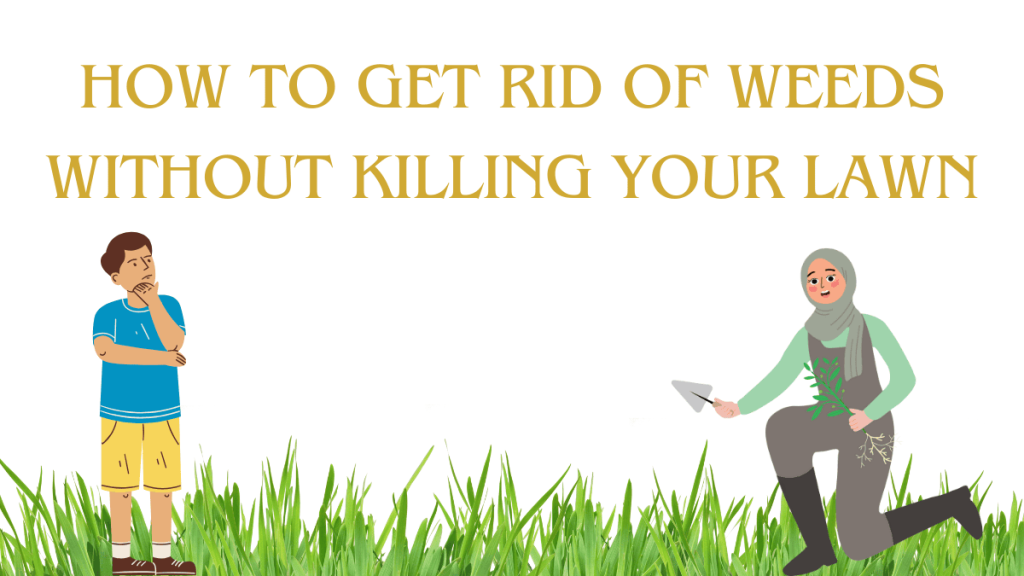How to Get Rid of Weeds Without Killing Your Lawn

Weeds are a common problem for homeowners, competing with grass for nutrients, water, and sunlight. While chemical herbicides might seem like an easy solution, they can damage your lawn and harm the environment. Fortunately, there are effective ways to remove weeds naturally while keeping your grass healthy and lush. By following proper lawn care techniques and using organic weed control methods, you can maintain a weed-free yard without sacrificing the health of your grass.
1. Maintain a Thick and Healthy Lawn
The best way to prevent weeds from growing is by keeping your lawn thick and healthy. A well-maintained lawn naturally outcompetes weeds by denying them space, sunlight, and nutrients. Mowing your grass at the correct height, ideally between 2.5 to 3 inches, helps shade the soil and prevent weed seeds from sprouting. Deep and infrequent watering encourages strong root growth, making your grass more resilient to weed invasion. Additionally, fertilizing regularly with a balanced, slow-release fertilizer ensures that your lawn remains strong and less vulnerable to weed growth. Aeration, which involves creating small holes in the soil, further enhances grass health by improving air and water circulation, reducing compacted soil that weeds thrive in.
2. Remove Weeds by Hand
Hand-pulling weeds is one of the most effective ways to remove them without harming your lawn. The best time to pull weeds is after rainfall or watering, as moist soil makes it easier to remove the entire root system. Using a hand weeder or dandelion digger can help extract deep-rooted weeds like dandelions, ensuring they don’t grow back. It is crucial to remove weeds before they have a chance to spread seeds, as this prevents future infestations. After pulling weeds, dispose of them properly by placing them in a compost bin or trash bag to avoid reseeding.
3. Apply Natural Weed Control Methods
Instead of using harsh chemicals, you can apply natural solutions that target weeds while keeping your grass safe. One effective option is corn gluten meal, an organic pre-emergent herbicide that prevents weed seeds from sprouting without affecting established grass. Another method is using boiling water to kill weeds growing in cracks or unwanted areas, though it should be used carefully to avoid damaging nearby grass. A vinegar-based weed killer, made by mixing white vinegar, salt, and dish soap, can also be sprayed directly onto weeds. However, this method should be used selectively, as vinegar can also harm grass if applied too broadly. Additionally, mulching around garden beds and lawn edges blocks sunlight, preventing weed seeds from germinating.
4. Overseed to Outcompete Weeds
Overseeding is a great way to naturally crowd out weeds by increasing the density of your lawn. This process involves spreading new grass seed over your existing lawn to fill in bare spots where weeds might grow. Choosing the right type of grass seed for your climate ensures that your lawn grows thick and strong. Overseeding is most effective in early fall or spring, when temperatures are mild and moisture levels are ideal for grass germination. Keeping the soil moist until the seeds establish will help them grow quickly, reducing the chances of weeds taking over. Over time, a thick lawn becomes a natural barrier against weeds.
5. Use Organic Pre-Emergent Herbicides
Pre-emergent herbicides work by stopping weed seeds from sprouting, making them a great preventative measure. Organic options like corn gluten meal provide a safe alternative to chemical-based weed killers, as they don’t harm existing grass. The best time to apply pre-emergent herbicides is in early spring and fall, before weeds like crabgrass and dandelions have a chance to grow. Regular use of pre-emergents can significantly reduce the number of weeds appearing in your lawn each year.
6. Regular Lawn Maintenance
Consistent lawn maintenance is key to preventing weeds from returning. Mowing regularly at the right height ensures that your grass remains thick enough to crowd out weeds. Watering deeply and less frequently strengthens grass roots, making them more resistant to weed invasion. Fertilizing your lawn with the right nutrients helps grass grow vigorously, leaving less room for weeds to establish. Additionally, inspecting your lawn frequently and removing weeds as soon as they appear prevents them from spreading and taking over your yard.
Final Thoughts: A Weed-Free Lawn Without Chemicals
Getting rid of weeds without killing your grass requires patience and proper lawn care practices. By maintaining a healthy, thick lawn, removing weeds by hand, using natural weed control methods, and implementing preventative strategies like overseeding and pre-emergent herbicides, you can effectively control weeds while preserving the beauty of your yard. A well-cared-for lawn naturally suppresses weeds, reducing the need for harmful chemicals. With consistency and the right approach, you can enjoy a lush, green, and weed-free lawn that enhances the beauty of your outdoor space.
